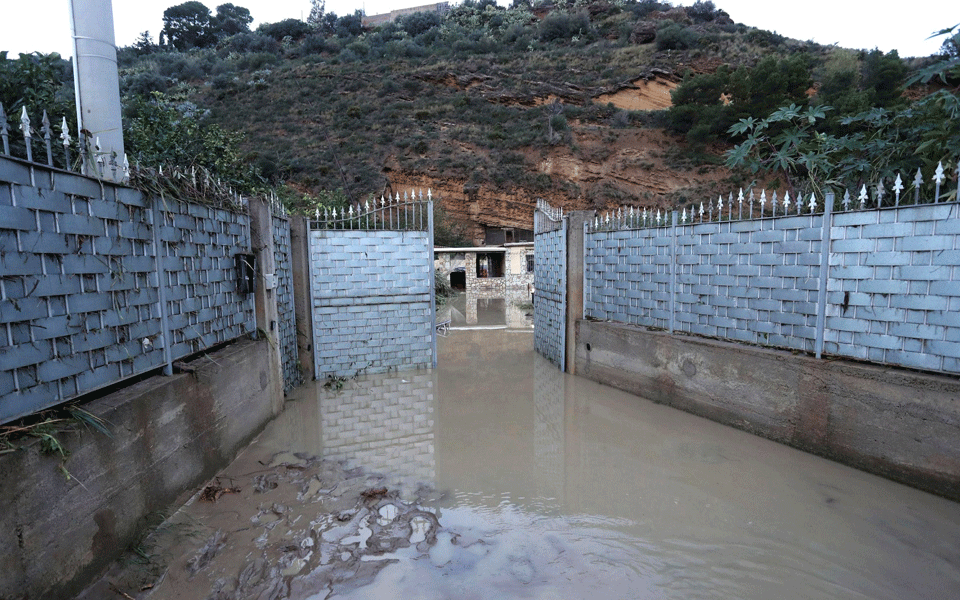Rome, Nov 4: Storms lashing Sicily have killed at least 12 people with torrential floods, Italian authorities said as the country's leader headed Sunday to the stricken Mediterranean island.
Divers pulled out nine of those victims from a home flooded by a rapidly swelling river in the countryside near Palermo.
State TV broadcaster RaiNews24 said the sole survivor of the flood that ravaged the home with water and mud was the owner, who had just stepped outside to walk the family dogs Saturday when the torrent hit.
News reports said the man at first clung to a tree, then ended up on the roof of a nearby house. He used his cellphone to call for help but it was too late for the others, who included a one-year-old baby, a three-year-old child and a teenager. The victims were from two families who had gathered in the country villa for the weekend.
A man's body was also found on a guardrail along a Palermo-area road after floodwaters swept away his car, Italian news reports said.
Across the island, in the town of Cammarata, near Agrigento, the fire department said its divers were working to recover the bodies of two people swept away while driving on a road near the flooding Saraceno River.
Also in Agrigento province, firefighters rescued 14 people from a hotel in the town of Montevago, which was threatened by floodwaters from the Belice River.
Agrigento, famed for the ruins of ancient Greek temples, is a popular tourist destination.
Elsewhere in Sicily, at least two other people were missing Sunday after floodwaters swept away their cars, including a doctor heading to the hospital in the hill town of Corleone.
Other storms had battered northern Italy earlier in the week, killing at least 15 people, uprooting millions of trees near Alpine valleys and leaving several Italian villages without electricity or road access for days.
In Casteldaccia, the hamlet where the river flooded the home in Sicily, neighbor Maria Concetta Alfano said she, her husband and their adult disabled daughter fled after barking dogs drew their attention to the rising waters in the Milicia River, the Italian news agency ANSA said.
It quoted the husband, Andrea Cardenale, as saying he drove away as "water was up to the hood of the car."
Rescuers retrieved the bodies from the home. A Sicilian prosecutor opened an investigation to determine if any human error, such as possible inadequate drainage of the river, might have played a role in the deaths.
Let the Truth be known. If you read VB and like VB, please be a VB Supporter and Help us deliver the Truth to one and all.
Hyderabad (PTI): Telangana Chief Minister A Revanth Reddy met Union Home Minister Amit Shah in Delhi on Wednesday night and urged him to increase the sanctioned strength of IPS officers to the state in view of its growing administrative and security needs.
The two leaders also discussed the recent surrender of several senior Maoist leaders before the Telangana Police and other issues.
"During the meeting, the two leaders discussed the issue of Maoist surrenders and their rehabilitation. The chief minister informed Shah that significant improvements in policing have taken place in Telangana over the past two years," an official release here said.
Highlighting that 591 Maoists have laid down their arms and joined the mainstream of society during this period, the chief minister said the state government was providing them compensation and rehabilitation assistance as per the rules.
He requested the Union home minister to extend financial support from the central government for development works in the backward regions of the state.
Reddy also urged Shah to increase the sanctioned strength of IPS officers to the state from 83 to 105 in line with the state's growing administrative and security needs, the statement said.
The first cadre review after the formation of Telangana was conducted in 2016, while the next review, due in 2021, was delayed and finally carried out in 2025. Even then, only seven additional IPS officers were allocated to the state, the chief minister informed Shah and requested that the third cadre review be conducted in 2026 as per the schedule.
Reddy explained that Telangana, like the rest of the country, is facing several modern challenges, including cybercrime, drug trafficking, white-collar crimes, and other emerging security threats.
He highlighted the reorganisation of the Hyderabad, Cyberabad, and Malkajgiri Police Commissionerates, the proposed formation of the Future City Commissionerate and the rapidly growing population in Hyderabad to underline the increasing administrative requirements of the state.





